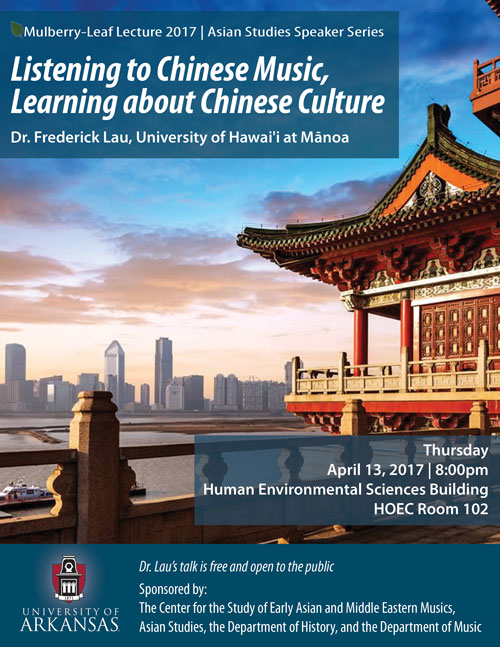This week, April 11-14, the Center for the Study of Early Asian and Middle Eastern Musics, Asian Studies, the Department of History, and the Department of Music will host Frederick Lau of the University of Hawaiʻi at Mānoa.
Lau will give the 2017 Mulberry-Leaf Lecture, as part of the Asian Studies Speaker Series, at 8 p.m. Thursday, April 13, in the Human Environmental Sciences Building (HOEC) Room 102. His lecture is titled "Listening to Chinese Music, Learning about Chinese Culture." He will also give a lecture demo in the Department of Music and meet with students from a number of departments during the week.
Lau's presentation focuses on ways of listening to Chinese music as avenues of understanding Chinese culture. Rather than viewing music as monolithic expressions above society, he argues that music is the agent and materiality that constitutes society and culture. He takes as assumption that Chinese music is ever changing and its meanings fluctuate according to the context and the larger cultural ethos. In this talk, Lau shares with audience ways to approach Chinese music and emphasized the context in which music was produced and consumed. The traditional social order, Confucianism, new social order of the 20th and 21st century to a large extent all shaped how music was performed, perceived, and signified. With examples of Confucian ritual music, guqin music, regional music, traditional genres, and pop music, Lau takes audiences through a wonderful journey through Chinese music history with nuanced understanding of the ethos of each period.
Frederick Lau
Frederick Lau has appeared as a soloist, recitalist, and conductor throughout Europe, Asia, and the United States. He has earned a reputation for his expressive style and interpretation of the baroque and avant-garde repertory. His solo appearance with the Berkeley Symphony under Kent Nagano was praised by critics for its "silvery tone and fine expressive performance that conjured up feelings of the ineffable…"
A musician of diverse musical interests, Lau received a B.A. in music with honors from the Chinese University of Hong Kong, and master's and doctoral degrees from the University of Illinois at Urbana-Champaign. His principal flute teachers include Alexander Murray, the former principal flutist with the London Symphony Orchestra, Trevor Wye, and Timothy Wilson. He was awarded a postgraduate performance diploma from the London Guildhall School of Music. In addition, he also studied with William Bennett, Kate Lucas, and Stephen Preston, Harvey Sollberger, Peter Lukas-Graf, and Julius Baker.
As an active chamber and orchestral musician, Lau has performed with several orchestra and chamber groups across the world. As a strong advocate of avant-garde music, he has collaborated with composers Salvatore Martirano, Brian Ferneyhough, Vicko Globokar, Harvey Sollberger, and David Liptak and has premiered many new compositions. He served as the music director of the SLO Youth Symphony Orchestra and the Cal Poly Chamber Orchestra, and associate principal flute of the SLO Symphony Orchestra.
He has published widely on traditional Chinese music, music and politics, music and nationalism, music in cross-cultural context, Chinese music in the diaspora, as well as issues related to 20th century Western avant-garde music. He is author of Music in China (Oxford 2008) and co-editor of Making Waves: Traveling Musics in Asia and the Pacific (UH Press, forthcoming), Vocal Music and Cultural Identity in Contemporary Music: Unlimited Voices in East Asia and the West (Routledge 2012), Locating East Asia in Western Art Music (Wesleyan 2004). He is the editor of a book series entitled Music and Performing Arts of Asia and the Pacific, University of Hawaii Press.
He is the president of the Society for Asian Music and former president of Music of East Asia Study Group and the Association for Chinese Music Research. He served as an external examiner and program reviewer for University of New South Wales, University of Melbourne, University of Hong Kong, UCLA, UBC, Chinese University of Hong Kong, and National Taipei University of the Arts. He is currently the chair and professor of ethnomusicology and director of the Center for Chinese Studies at the University of Hawaiʻi at Mānoa.
About the Asian Studies Program: The Asian Studies Program draws on the strength of faculty both in the Fulbright College of Arts and Sciences and in other colleges on campus to provide resources and training in Asian languages, cultures, history, politics, and economics. The program strives to provide students with a well-rounded education essential for careers in which knowledge of Asia is vital, promote interdisciplinary research on the Pacific region, and serve as a source of knowledge and expertise for the community.
For more information on Asian Studies, visit their website through the J. William Fulbright College of Arts and Sciences.
Topics
Contacts
Justin R. Hunter, administrative specialist III
Department of Music
479-575-4702,
